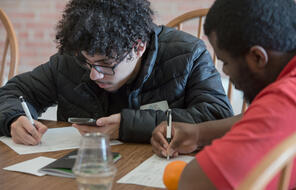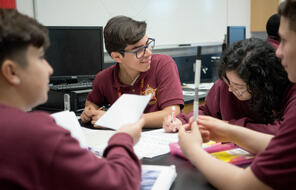“A Kingdom Bright and Burning” by Dave Connis from Welcome Home
Subject
- English & Language Arts
Language
English — USUpdated
Get it in Google Drive!
Get everything you need including content from this page
Get it in Google Drive!
Get everything you need including content from this page
“A Kingdom Bright and Burning”
by Dave Connis
Inside: 2/7/15
Though it was my kingdom, I didn’t know the king.
I didn’t know anyone in it, really. I’d built everything I saw, but I’d never talked to a single soul. I couldn’t be seen. I was too afraid of the citizens. Afraid they’d realize I was the one who built it, and then they’d leave, and then I’d really be alone.
I built the kingdom’s first tower out of stones I pulled from a quarry hidden in the deep of the Western Forest, and travelers passing through have always gathered around that tower at night. Something about the stones, maybe their strength and solidity, called to them. The tower gave them a comfort I’d spent my whole life trying to find.
Ironically, I built the kingdom hoping that, eventually, I’d find comfort or belonging in it somewhere. Maybe in the corner of Mickey Cobbler’s shop in the village square, or in watching a bard in the Rusted Root Tavern. I thought maybe the correct combination of timber and rock would get me somewhere, but it didn’t, no matter how much I built.
After all these years, I’m no closer to finding what I’m looking for than I was when I started. That was why I’d never go meet them. The travelers, I mean. I couldn’t bear to look them in the eye knowing they’d found what I wanted. Instead, I just watched them from my favorite tree, an ancient oak. The tallest tree of the Western Forest. The tree told me what the birds said as they rested in his branches, and that day, the birds had been in a heated debate about how the kingdom began.
“And what do they say?” I asked him.
“Fables. A story of a simple man drinking it into existence at a tavern or the sneeze of a wizard while getting off his horse.”
“Never me.”
“No. Never a boy.”
I couldn’t remember how I built it, but I did, every last bit. I even knew what the castle looked like. I knew its secret passages better than I knew myself.
“Mickey Cobbler made that boy’s shoes,” I said, pointing at a traveler boy.
Oak shivered his leaves, and a few brushed against the nape of my neck. “Mickey does fine work. Very fine. You know, Zeke, you should meet him. If you met him, you could probably get your own pair of shoes.”
“I can’t.”
“You built this place for them,” he says, stretching a limb toward the travelers. “You should be with them. What’s the point of building an entire kingdom if you can’t call it home?”
I plucked a leaf off one of his branches, and he quieted. Minutes later, I climbed down him and made my way toward the
Wizard’s Guild
. They had an unguarded pantry that often kept me fed.
I snuck into a guild through an open window and then ran down a set of spiral stairs. I got to the bottom and saw the pantry door, as it always was, unlatched and open. A baguette hung off the shelf next to a sack of potatoes. I reached for it slowly, sure not to make a noise.
“Your family is coming today,” a voice said.
I spun.
A stocky woman, whose black and billowy robes sat on her shoulders with a welcoming grace and lightness, stood behind me. She had a whisper of beard, too, which I found somewhat funny, even though I didn’t laugh. I wasn’t allowed to laugh in my kingdom. The only thing I did there was travel in the darkness of night and shadow and watch who came, who went, and everything in between.
I was the watchman.
“Are you excited?” the woman asked. I didn’t say anything.
I was too shocked to hear a voice this close. Never in the years of the kingdom had I been spoken to, outside of Oak, and my ears almost hurt from a tone that was directed only to me. A sound made specifically for my understanding. Did all closeness hurt this much?
“Well, all right, then . . . you’ll have to come with me.”
The woman reached for me.
I ran.
Outside: 2/7/15
Anita Marzipan had the kind of posture that made chiropractors wish they’d gotten a degree in business administration and started a local pub. Her back was more of a crescent than a spine, and her feet were flat, which caused her to walk bent forward with an awkward bob of the head.
So when Anita walked straight into the office of the orphanage director, Mary Detwiler, all these unique faculties were at play in the most dramatic fashion. The night before, Anita had received a call from Mary letting her know that a family had shown interest in adopting one of the orphans. One would think that Anita would be happy for the child, but she felt such bitterness toward childish things that she was only happy for herself. For ridding the orphanage of another whiny rook.
Ezekial Most sat in the chair in front of Mary’s desk. He was silent. Distant. The cold look of someone who’d never had a fridge or pantry door to open without asking.
“So,” Anita said, frowning. She hated
Apathetic
children.
“The silent one is leaving us?”
Mary frowned. “The Abernathys have signed the papers and will be here to pick him up within the next two hours.”
Anita stared hard at the buzzed head of the child. If he’d heard what Mary said, he made no show of emotion. It appeared that that day was no different than any other for the Most boy.
“Who are the Abernathys?” Anita asked.
“They live in Sacco. Own a restaurant in the harbor that’s been in their family for years. I Don’t Give a Clam, if you’re familiar. My sister says they attend her church. Good folk.”
Anita snorted. She hated God-fearing folk, especially the ones that adopted apathetic children.
“They do understand what they’re signing up for?” Anita asked.
Mary gave Anita a trenchant nod, then turned to the boy and said, “Zeke, Anita and I will be right back.”
The boy, again, said nothing.
Mary stood up from her desk and pulled Anita into the hallway.
“Do they know they’re adopting a twelve-year-old mute?”
Anita was what she considered a safe distance from the boy—barely three steps.
With a sharp flick of her hand and slight curl of her lip, Mary motioned for Anita to move out of earshot. “He is not mute, Anita. The janitor claims he’s heard him speak when he’s alone.”
“That wasn’t my question.”
Mary sighed. “They are aware his late father’s abuse had negative effects on him. They are aware that Ezekiel prefers not to speak, and they are the kind of folk that sign the papers regardless of what they know.”
Inside: 2/7/15
Running through the town square was all it took for me to realize something was wrong. Somehow, the townspeople watched me through the walls of buildings. I didn’t know how they knew I was there, but they did. Their gaze followed me as I ran back to Oak.
I climbed up and up and up, deep into his branches.
“Did you feel the earthquake?” he asked.
I nodded even though I didn’t know that’s what I’d felt.
I assumed I was responsible for my own trembling. My fear caused my feet to shudder.
“What’s happening?”
Oak’s bark roughened under my hands.
“The kingdom is under attack.”
“How? We don’t have any enemies. I never built enemies.”
Outside: 8/2/15
Mr. Abernathy pushed his glasses back onto his nose as he watched his wife’s fingers grip tighter and tighter around her cereal spoon. He pushed his iPhone aside, thought he was one candy away from a new score, and prepared for what she'd say next.
“I just don’t think he hears us,” she finally said.
He smiled; it was gentle, understanding, but firm, much like an autumn breeze. “For some, love takes a long time to hear.”
“We love you, Zeke,” Mrs. Abernathy said, but Zeke said nothing.
A few minutes later, Mr. Abernathy broke the painful silence with the rustle of his coat sleeve, soaking up a tear from his wife’s cheek before it fell into her cereal.
Outside: 3/19/19
“I love you, Zeke,” Mrs. Abernathy said on the drive home from the latest emergency delivery. She always asked to deliver more lobster if the kitchen ran out because it gave her the chance to sneak a few spoonfuls of Chef Mematiane’s lobster chowder while he and the bulk of the staff were busy unloading.
Zeke, as he had for the last four years, said nothing.
Mrs. Abernathy didn’t notice the reciprocated glance. A glance so small it could’ve fit within an atom.
Inside: 3/19/19
It had been years since the attack started.
Everything was dying. The buildings were in a progressive decay, crumbling more and more with every pass of the sun. The streets were filled with expanding sinkholes, their foundation attacked by something I couldn’t see.
“Any news?” I asked Oak.
“The birds have found nothing and no one. The land around us is empty.”
I groaned. “What do we do?”
The oak shook his leaves. “We should consider surrender.”
Surrender? To an unknown enemy? The whole kingdom? The place where I’ve lived my whole life? The safest place?
“Most of the citizens have left, Zeke.”
“This is how it was, you know. Before the king and the citizens. I don’t mind fewer people.”
From the branches of Oak, I saw another building collapse.
I knew that one. It was Mickey Cobbler’s. It toppled with a plume of dust, and before it settled, another earthquake shook the ground. It was like every quale that had come before. Small and sturdy. It was as if the fault line was directly under me.
Another stone shook from its place in the massive wall surrounding my kingdom. A beam of bright light poured through the hole, punching the ground below with a glow as noticeable as the red flames of a fire.
Thousands of those thirsty beams existed, rays of sun shimmering through clouds of dust, and their number grew every day. I knew that the shadows I used to travel in wouldn’t last much longer.
I thought about the danger of surrender, the intense heat of light coming through the new hole in my wall. I slid down Oak and stood by him, watching the dust of all the lost buildings float through the sea of speckled blazes.
My finger was swallowed by a brightness I felt in the innermost marrow of bones. A sear both cold and hot. Tearing and melting.
I cried and ran back to Oak.
I settled in his branches. “Nope. We can’t surrender.”
Outside: 8/9/19
“Are you ready for your first day of high school?” Mrs. Abernathy asked Zeke as he readied his lunch: a bag of thinly sliced apples and a turkey sandwich on a pretzel bun. She knew this was his favorite lunch every simply because he looked at her when she made him these things.
“I bet you are,” she continued. “You get to see Mrs. Bailey again. She moved up from the elementary school to teach English. Stand up.”
Zeke stood, and Mrs. Abernathy fingered his shirt collar and fidgeted with a tuft of hair sticking toward heaven on the back of his head. “Okay, you look good. Ready to go? All right, let’s go.”
Inside: 10/2/19
There was nothing left.
Nothing but the walls, and even they were filled with holes.
“They will collapse soon,” Oak said, his leaves the fiery red of fall. “You can either choose surrender or have it forced upon you. There’s no hiding it anymore.”
“We can’t. I’m alive here. If I surrender, I’m afraid I’ll die.”
Oak stayed silent, and his silence confirmed it.
“It’s safe here,” I added, though it was as obvious as the skin on my body that it wasn’t.
Oak took a deep breath. I felt his bark expand under my feet. “It has never been safe here, only comfortable. Why do humans always assume that those are the same thing? He paused. “Answer me something, before I die. Why do humans assume that isolation means safety?”
“You won’t die, Oak. I planted you.”
“Answer my question.”
“If I’m alone, I won’t be hurt.”
“Then why do you hurt when you are alone?”
I looked at him, his question coursing through my veins, and that’s when his leaves began to drop. It was fall, but his leaves weren’t dropping because the season commanded it. It was obvious by the way they fell, straight down as if they carried weight instead of a calm flutter, that they were falling like the rest of the kingdom. Was I the only one who refused to believe that falling was the only choice?
“You’re choosing this. Don’t leave me here,” I begged.
“Please, Oak.”
“I’m confident in my choice. The king will die soon, Zeke, and when he does, will you die with him? He will die paralyzed. His life a hostage to fear. Will you follow him?”
“I don’t know the king,” I said. Tears streamed down my face, watering the Oak’s dying branches. “I’ve never known the king. You know that!”
“Of course you have,” Oak said. “It’s you.”
The last of his leaves fell to the ground, and immediately I felt the spirit of his company fade like the warmth of the sun as it dips below the horizon. For hours after he left me, all I could do was sit in his branches and cry.
Eventually, I climbed down him, but I didn’t leave. I sat underneath him and watched as his limbs decayed, each one snapping from his trunk and falling to the ground like an earthen icicle. As time passed, all that wasn’t limb and branch—his stump, his roots—turned into dust and blew away.
In the hours I spent watching Oak die, I realized three things:
I was alone. I was the king. And I still hurt.
Outside: 12/29/19
Mr. Abernathy threw another log on the fire. The rest of his family had abandoned him to the flames hours ago in search of sleep. He sat and stared at the blaze with a heavy mind. He considered picking up the Xbox controller to play a silent game of FIFA, but he was too distracted with processing the “whats,” “whys,” and “hows” that plague most humans when they reach the New Year.
Would Zeke speak by the time his sister, two years old, began to bring boys home? Why could Zeke hear so well, and do everything asked of him, yet never find words? Would the coming year be the year he spoke? Was he, Mr. Abernathy, hoping where hope didn’t exist?
Maybe love and time couldn’t fix the most collided of collisions.
In the midst of his fervent hoping, Zeke came out of his room and say next to Mr. Abernathy on the couch.
“Can’t sleep?” Mr. Abernathy on the couch.
Zeke didn’t answer.
“I just put another log on the fire. You can hang here for a while. Maybe that will help.”
And then, much to Mr. Abernathy’s surprise, Zeke began to cry.
Inside: 12/29/19
I was in the center of the kingdom, where it was darkest, but even there the beams of light swallowed most of the space around me.
I sat in the spent ashes of my oak’s limbs. He’d kept me warm, but I’d just thrown his final limb on the fire. It went up in a quick flare of heat, and just as quickly turned to smoldering coal. The fire was dying, and as the light waned, I knew I’d die there. In that ever-present darkness. I also knew that my wall wouldn’t fall unless I asked it to.
My enemy had stopped shaking the stones loose. That way, the decision to surrender would be mine. I knew I’d die either way, in the dark or in the light. I knew because I was the king. I was alone. I hurt. I thought of the kinds of death I’d meet in the darkness, and they frightened me. Starvation. Slow and painful. Pneumonia. Slow and cold.
Every death slow.
As my fire’s coals turned to black and crumbled with one final puff of smoke, I knew what I had to do.
I stood and walked toward the west section of the wall, but I did not stand in the beams of light. Their brilliant forms rested on burnt grass only inches from my feet.
In the dark, I’d die forever. In the light, I’d only burn for seconds.
I wiped my cheeks and took my last breath.
“Walls, fall,” I said, voice trembling.
With an ancient rumble, the earth beneath me began to shake. Stones clattered against themselves before falling with heavy thuds to the ground. And then, all at once, the walls fell and what had kept the light at bay was nothing more than a pile of ash. The light screamed through. The burn I’d felt on my finger before wrapped around me hot and fiery.
In the light of my last moments, I saw buildings past the crumbled line of what was my wall. It was a new kingdom bright and burning, and the more myself died in the light, the bigger the kingdom became. And right before there was nothing left of me, I knew the burning kingdom hadn’t come to end my reign.
It had come to bring me home.
Outside: 12/29/19
Mr. Abernathy held his son and cried with him too, though he knew they weren’t crying for the same reasons. Despite these reasons, he knew that moment meant something. The last four years of Zeke’s silence had been broken not by my words, but by sobs, and thought Mr. Abernathy was sad that the silence wasn’t put to death with audible verse, he was aware of humanity enough to know that tears were just as complex and loud.
“Ezekiel,” Mr. Abernathy said, his tears seeping into the couch cushions. He asked the question he’d asked every day for the last four years. “Do you hear me?”
The fire crackled. Mrs. Abernathy snored in the bedroom. The clock ticked as it always had. Mr. Abernathy loved like he always had.
It was the most normal of evenings.
“Yes.”
Credit Line: Dave Connis, “A Kingdom Bright and Burning” from Welcome Home.
Use the "A Kingdom Bright and Burning" TQE Small-Group Discussion handout to help students analyze this text.
Teach these materials with a Facing History lesson plan.
- Wizard’s GuildWizard’s Guild: referenced in games as a group of Wizards who strive to improve the world.
- ApatheticApathetic: indifferent, unconcerned.
How to Cite This Reading
Facing History & Ourselves, ““A Kingdom Bright and Burning” by Dave Connis from <em>Welcome Home</em>”, last updated August 8, 2024.












